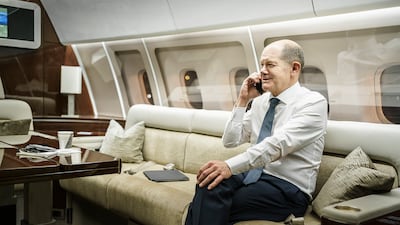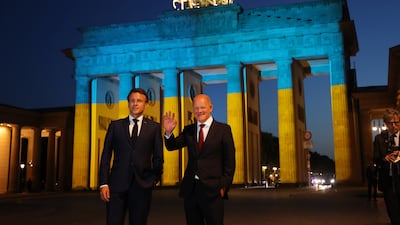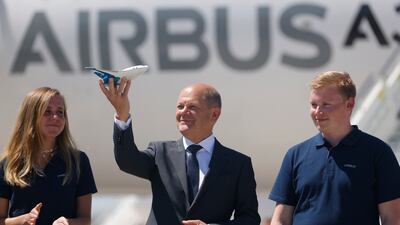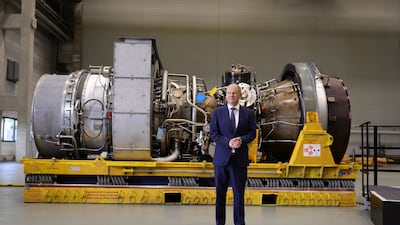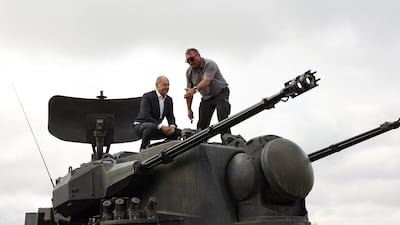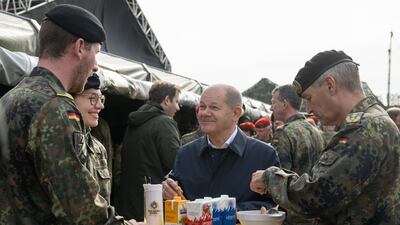German Chancellor Olaf Scholz has endured a turbulent first year in power, dominated by the war in Ukraine that pushed him out of his comfort zone, and capped by the discovery of a far-right plot to overthrow him.
The softly spoken Mr Scholz took office 12 months ago by promising to continue the quiet, nothing-flashy competence of his predecessor Angela Merkel.
Those very qualities have since become a stick with which to beat Mr Scholz, whose critics accuse him of hesitant leadership that has failed to meet the moment.
Defenders of his three-party coalition, made up of Social Democrats (SPD), Greens and pro-business liberals (FDP), say much important work has been done under the radar.
“The argument the German government always makes is they had a big backlog to fill from the previous government,” said Pieter de Pous, who advises diplomats for the E3G climate think tank.
All three parties have had to cross red lines in a year of crisis, with the Greens extending coal and nuclear plants, the FDP backing vast public spending and the SPD no longer championing dialogue with Moscow.
And Germany itself has been called upon to break with the past and assume a more muscular leadership role in Europe.
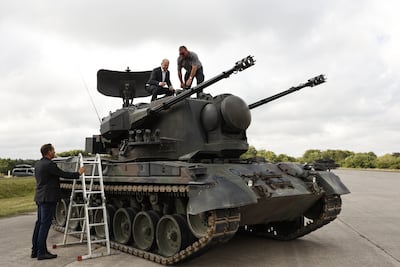
Image problems
When The National followed Mr Scholz’s election campaign, there was no escaping his face on ubiquitous red posters that touted his leadership skills and little else.
Yet Mr Scholz’s aides have had several unforced PR blunders to explain, from brusquely snubbing a female journalist to laughing at a voter’s cost-of-living woes.
Prone to getting irritated by questions, Mr Scholz seemed so withdrawn at times that his camera-friendly deputy Robert Habeck was jokingly described as the real chancellor.
A more damaging image problem was that Ukraine considered Berlin too slow to respond to the Russian invasion, with some MPs accusing Mr Scholz of damaging Germany’s reputation.
Sarah Raine, a former British diplomat, told an International Institute of Strategic Studies panel that some of Germany's communications had been "pretty terrible".
“We have this consistent putting their foot in it," she said. "They’re their own worst enemies.”
Mr Scholz, who hosted this year’s G7 summit in the Bavarian Alps, maintains that Germany is acting in lockstep with allies.
Germany’s military aid since the invasion is the fourth-largest behind the US, Britain and Poland, according to a tracker maintained by the Kiel Institute for the World Economy.
“The Americans would probably say 'welcome to our world'," Mr Scholz’s chief of staff Wolfgang Schmidt said. "Whatever we do, some will say we’re doing too much, too quickly and the others say we’re too slow.
“We are in this situation now, too. We are the biggest country in the heart of Europe, we’re the most powerful economy and of course expectations come with that role and they’re being made clear.”
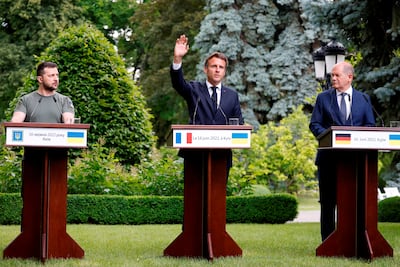
Energy crisis
Not natural allies, Mr Scholz’s coalition partners united behind a programme to modernise Germany and turn its economy green.
Their energy goals have taken on greater significance since the war forced Germany to stop relying on Russian gas.
A package passed by MPs in July gave a push to wind and solar power and set a target of 100 per cent clean energy by 2035.
The catch is that the search for alternatives to Russia has also forced Germany to reopen coal plants and buy more gas on the world market.
The National witnessed a landmark moment last month as a new gas terminal in the North Sea was declared ready only 194 days after work began.
But Mr de Pous said the extra fossil fuels weakened Germany’s credibility in pushing for global climate action.
“That is going to lead to emissions they weren’t planning on having, those emissions still will need to be addressed somewhere,” he said.
“That acceleration of renewables is totally happening here. But in the case of Germany, it’s happening after a period of very low growth. It’s just not enough to address the impact of all the Russian gas imports.
“Germany was about to regain some of its credibility as an energy transition leader. But all of that is of course being undermined by the fact that it’s very aggressively shopping for gas.”
Mr Scholz has hailed progress on other key election pledges including an increase in the minimum wage and a shake-up to benefits.
Ministers plan to spend up to €200 billion ($210.13 billion) bailing out households and businesses during the energy crisis.
The Greens and FDP have squabbled over everything from nuclear power and fracking to speed limits on Germany’s motorways.
They reached a truce on Germany’s lucrative car industry by agreeing the EU would set emissions rules at a future date.
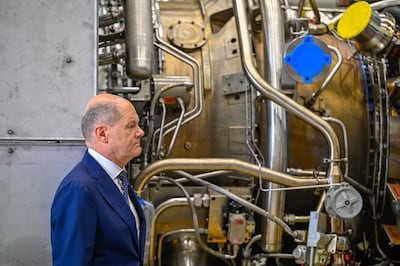
The Merkel years, once a byword for stability, now feature in Mr Scholz’s speeches as a mess to be cleaned up (he served in her cabinet in two separate stints).
Senior figures say openly — although Mrs Merkel does not — that Germany was wrong to become so reliant on Russia and that its years-long overtures to Moscow, borne of war guilt and a desire for reconciliation, were a mistake.
The same applies to defence, with parties blaming each other for shortfalls in German armaments that have restricted its aid to Ukraine.
Mr Scholz announced a €100 billion ($104.67 billion) upgrade to the military and promised to increase annual defence spending as part of what he called a "Zeitenwende", or changing of the times.
Yet his aide and spokesman Steffen Hebestreit admitted this week that the Nato target of spending 2 per cent of GDP on defence was unlikely to be met until 2024 at the earliest.
And a plan to buy American F-35 jets with part of the €100bn pot has been bogged down in bureaucracy.
Polls show the year of crisis has taken its toll. Only 36 per cent were satisfied with Mr Scholz in an RTL/ntv survey this week, with 63 per cent dissatisfied.
"Governing doesn't mean learning on the job, but taking responsibility from the start," opposition MP Marc Biadacz said in a scathing review of the year.
Still, 88 per cent agree the government has been dealt a tougher hand than its predecessors.
And fewer than one in four say Germany would be better off under opposition leader Friedrich Merz — accused by Mr Scholz, in a rare rhetorical flourish, of “Alice in Wonderland” politics.


